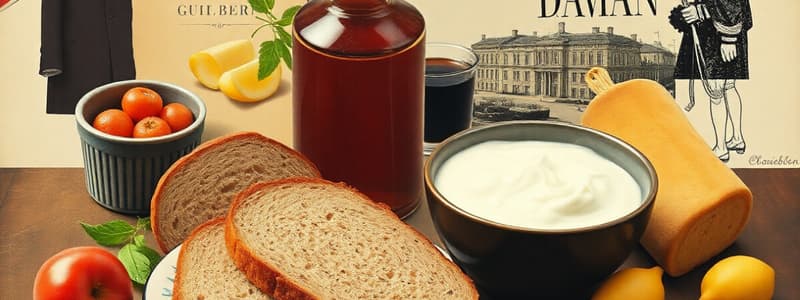Podcast
Questions and Answers
Which historical event significantly influenced English cuisine by bringing French culinary practices?
Which historical event significantly influenced English cuisine by bringing French culinary practices?
- The Norman Conquest (correct)
- Roman occupation
- Post-war changes
- The Tudor period
Which dish is traditionally served with Yorkshire pudding?
Which dish is traditionally served with Yorkshire pudding?
- Roast beef (correct)
- Fish and chips
- Shepherd's pie
- Cornish pasties
What is a primary staple food in traditional English dishes?
What is a primary staple food in traditional English dishes?
- Quinoa
- Rice
- Pasta
- Potatoes (correct)
How did the Industrial Revolution influence English food practices?
How did the Industrial Revolution influence English food practices?
Which of the following is characterized as a simple, substantial meal comprising bread, cheese, and cold cuts?
Which of the following is characterized as a simple, substantial meal comprising bread, cheese, and cold cuts?
Which statement best describes modern English cuisine?
Which statement best describes modern English cuisine?
Which dish consists of a meat filling topped with mashed potatoes?
Which dish consists of a meat filling topped with mashed potatoes?
What trend is becoming popular in modern English cuisine, focusing on sustainable food practices?
What trend is becoming popular in modern English cuisine, focusing on sustainable food practices?
Flashcards
English cuisine and its history
English cuisine and its history
English cooking has changed over many years, with important periods of adaptation and influence, from Roman times to modern influences.
Characteristics of traditional English food
Characteristics of traditional English food
Traditional English dishes are often made with basic, hearty ingredients, with simple but effective preparation techniques.
Impact of the Norman Conquest on English food
Impact of the Norman Conquest on English food
The arrival of the Normans in the 11th century significantly impacted English cooking. They introduced French cooking methods and techniques.
Modern English cuisine
Modern English cuisine
Signup and view all the flashcards
What is roast beef?
What is roast beef?
Signup and view all the flashcards
What is fish and chips?
What is fish and chips?
Signup and view all the flashcards
What is a Sunday roast?
What is a Sunday roast?
Signup and view all the flashcards
What is Shepherd's pie?
What is Shepherd's pie?
Signup and view all the flashcards
Study Notes
Overview of English Cuisine
- English cuisine is diverse, evolving over centuries and influenced by various historical events and cultural interactions.
- Traditional dishes often center around hearty ingredients and simple preparations.
- Modern English food incorporates global flavors and culinary techniques.
Key Historical Influences
- Roman occupation introduced ingredients like apples, pears, and wine.
- The Norman Conquest in the 11th century led to significant changes, bringing French culinary practices and techniques.
- The Tudor period saw some shifts, with an increasing emphasis on game and spices.
- The Industrial Revolution and later eras brought changes in food production and availability, leading to new recipes and ingredients.
- Post-war England saw an increase in international influences, particularly from American cuisine.
Staple Foods and Ingredients
- Potatoes and other root vegetables are common staples, playing a significant role in traditional dishes.
- Meat, including beef, lamb, and pork, is frequently featured.
- Fish and seafood, particularly from coastal regions, are significant parts of the diet.
- Dairy products like milk, cheese, and butter are used widely.
- Bread is a fundamental component, particularly in many traditional meals.
- Vegetables like carrots, peas, and beans are frequently found in English dishes.
Common Traditional Dishes
- Roast beef is a quintessential English dish, often served with Yorkshire pudding.
- Fish and chips, a popular takeaway, combines fried fish with crispy chips.
- Sunday roast, a traditional Sunday meal, typically features roast meat, vegetables, and gravy.
- Shepherd's pie, a savory dish consisting of a meat filling topped with mashed potatoes.
- Cornish pasties offer a flaky pastry case filled with savory meat and vegetables.
- Ploughman's lunch is a simple but substantial meal comprising bread, cheese, pickles, and cold cuts.
- Spotted Dick is a steamed pudding made with suet and spices.
- Toad in the hole is a hearty dish featuring sausages baked within a batter of batter.
Modern English Cuisine
- English chefs and culinary creatives are embracing new techniques and global flavors, often using locally sourced ingredients.
- Modern English cuisine frequently emphasizes seasonal produce and the use of high-quality local ingredients.
- Fusion cuisines are becoming increasingly prevalent.
- Farm-to-table approaches are gaining popularity, focusing on sustainable food practices.
- Emphasis on simple preparations with locally sourced produce is common.
Contemporary Trends
- Regional variations in English cuisine are still apparent.
- The increasing awareness of food provenance is influencing consumer choices.
- Organic and locally-sourced produce is becoming more common.
- Interest in healthy eating and reduced meat consumption is becoming apparent.
- Culinary tourism is growing, showcasing diverse food experiences throughout England.
Studying That Suits You
Use AI to generate personalized quizzes and flashcards to suit your learning preferences.




